- Home
- Franklin W. Dixon
Training for Trouble
Training for Trouble Read online
THEHARDY BOYS
JUDO . . . FENCING . . . ARCHERY . . . BIATHLON . . . SOMEONE WANTS TO WIN—AT ANY COST!
The combat sports training facility has just opened in Bayport, and the Hardys are on hand to check it out. They can practice judo, fencing, archery, and biathlon, and meet aspiring athletes from all over.
But good times turn to bad sportsmanship when Joe’s girlfriend, Iola, gets a nasty electrical shock during a fencing workout. Then someone decides to use Frank for target practice on the archery range. Now the Hardys are wondering if the events are more than accidents. How far will world-class competitors go to win?
TRAINING FOR TROUBLE
ALADDIN
Simon & Schuster
Cover illustration © 2000
by Jeff Walker
Ages 8–12
WEB SITE www.Kids.SimonandSchuster.com
Night Scare
Frank glanced in the rearview mirror for the third or fourth time in the past few moments.
“What’s up?” Joe asked.
“I’m not sure,” Frank said. “The same car’s been right behind us for a long time.” Frank took a series of quick right turns, leaving and then circling back to their normal route home.
“Still there?” Joe asked.
“Nope. I’m just paranoid, I guess.”
The Hardys came to their street, and Frank started slowing for their driveway. Up ahead, a set of headlights winked on, piercing the darkness. The lights came closer, then angled toward the van. White light filled the windshield.
“What’s that car doing?” Joe asked.
Frank slammed on the brakes. “Hold on!” he shouted. “It’s coming straight for us!”
The Hardy Boys
Mystery Stories
#109 The Prime-Time Crime
#110 The Secret of Sigma Seven
#139 The Search for the Snow Leopard
#140 Slam Dunk Sabotage
#141 The Desert Thieves
#143 The Giant Rat of Sumatra
#152 Danger in the Extreme
#153 Eye on Crime
#154 The Caribbean Cruise Caper
#156 A Will to Survive
#159 Daredevils
#160 A Came Called Chaos
#161 Training for Trouble
#162 The End of the Trail
#163 The Spy That Never Lies
#164 Skin & Bones
#165 Crime in the Cards
#166 Past and Present Danger
#167 Trouble Times Two
#168 The Castle Conundrum
#169 Ghost of a Chance
#170 Kickoff to Danger
#171 The Test Case
The Hardy Boys Ghost Stories
This book is a work of fiction. Any references to historical events, real people, or real locales are used fictitiously. Other names, characters, places, and incidents are the product of the author’s imagination, and any resemblance to actual events or locales or persons, living or dead, is entirely coincidental.
First Aladdin Paperbacks edition January 2002
First Minstrel Books edition May 2000
Copyright © 2000 by Simon & Schuster Inc.
ALADDIN PAPERBACKS
An imprint of Simon & Schuster
Children’s Publishing Division
1230 Avenue of the Americas
New York, New York 10020
www.SimonandSchuster.com
All rights reserved, including the right of reproduction in whole or in part in any form.
THE HARDY BOYS and THE HARDY BOYS MYSTERY STORIES are trademarks of Simon & Schuster, Inc.
ISBN-13: 978-0-671-04758-0
ISBN-10: 0-671-04758-2
ISBN-13: 978-1-4391-1423-0 (eBook)
Contents
* * *
1 Shocking Touch
2 Human Bull’s-eye
3 A Pointed Message
4 Who’s the Hero?
5 Rafter Rescue
6 Foiled
7 Emergency Alarm
8 William Telltale Clues
9 An Unsanctioned Match
10 Hospital Horror
11 Cross-country Combat
12 False Confession?
13 Crossbow Kidnapping
14 The Final Fall
TRAINING FOR TROUBLE
1 Shocking Touch
* * *
Joe Hardy crouched low and flexed his left hand. Somehow he had jammed his wrist during the last skirmish. Shaking off the pain, he circled to his left. His opponent was quick and strong, and Joe had to be ready to defend himself.
“What now?” he asked.
“Don’t let him get an inside grip,” someone shouted.
“Keep your feet apart,” another voice added.
Before Joe could sort out the advice, his opponent was on him again, grabbing for his collar.
The two of them locked together, each clutching fistfuls of the other’s shirt. Their heads knocked together, and Joe felt a splash of sweat or blood trickle down his brow. He shifted his balance, trying to catch his opponent off guard, but the guy anticipated his every move.
It was Friday evening, and Joe, his brother, Frank, and a few hundred other citizens of Bayport had been invited to tour the new Olympic Combat-Sports Training Facility.
Here, athletes from the U.S. Olympic and Junior Olympic fencing, archery, judo, and biathlon teams would train year-round for their events. While most of the visitors were milling around the equipment or taking a tour of the building, some brave souls, like Joe, were allowed to test their skills against the best athletes in the world.
Joe took a couple of deep breaths. He’d held his own during his judo match until that last fall, when he had been caught in a painful arm lock. He had managed to rip free by turning a somersault to untwist his arm and was about to counter when Reid Sokal, head coach of the Junior Olympic teams stepped in and said not to fight too hard. He was afraid someone might get seriously hurt.
Now they were facing off for the final fall, with neither one willing to let up on the intensity.
Joe’s opponent shuffled his feet, and Joe saw his chance. He yanked back hard, then quickly stepped forward, placing his left foot behind the other guy to sweep his legs out from under him. He pushed with all his might.
Joe felt his opponent’s grip on his collar relax. For a split second he had a feeling of triumph—he was about to toss an experienced black belt to the floor with a perfectly executed inner reaping throw!
Somehow, that didn’t happen.
Joe found himself falling forward. He fought to keep his balance, but a sharp blow to his stomach made him gasp and lifted him off his feet. He reached for something to hold on to—but caught only air. The floor, then the ceiling, rotated by in what seemed like slow motion.
His brain was still trying to figure out what went wrong when he landed on his back with a rib-rattling whump!
Joe lay still. He looked up at the ceiling and watched the fans high above turn slowly. He smelled the new rubber of the judo mat beneath him. But he couldn’t hear anything. His ears seemed stopped up, plugged.
Then, all at once, voices broke through.
“Nice throw, Allen!” someone shouted.
“Beautiful countermove, man!”
A stocky guy with dark hair trimmed in a military-style crew cut appeared above Joe, his hand extended to help him up. It was Allen Frierson, the opponent who’d just nailed him with a nifty throw.
Joe grabbed Allen’s hand and hoisted himself to his feet.
“Good match,” he said, slapping Allen on the back. “But what happened?”
Frank Hardy stepped onto the mat. “You got tossed through the air like a rag doll,” he told his younger brother with a gri
n.
Joe rubbed his wrist. “Why don’t you go a couple of falls, smart guy? See how long you last.”
Frank smiled. “No way. Being treated like a crash-test dummy isn’t my idea of a good time.”
Frank Hardy was one year older than his brother and, at six-one, an inch taller. Though he was just as good an athlete as Joe, he liked to make use of his quickness and skill rather than brute strength.
Allen Frierson introduced himself to Frank. “That was a stomach throw I used on your brother,” he said.
“It happened too fast,” Joe said.
Allen nodded. “When you pushed forward at me, I dropped to the ground. Instead of pulling you on top of me, I jammed my foot into your stomach and flipped you back over my head.”
“Pretty effective,” Frank said.
“Good job, kid. You have fun?” Coach Sokal asked, striding onto the mat and tossing a towel to Joe.
Joe smiled and draped the towel over his blond hair like a hood. “Yeah, but I think I’ll stick to football for now.”
Sokal laughed, but his expression changed as he turned to Allen. “You need to be more aggressive if you want to make my team, Frierson,” he said. “Stop waiting around for something to happen.”
Coach Sokal appeared to be in his midthirties, and to Joe he resembled a super-tough army sergeant. His hands were oversized, and his ears were rubbery and scarred from hundreds of falls.
He wore jeans and a gray sweatshirt emblazoned with the training facility logo: an American flag with two pairs of small figures in silhouette facing off in judo and fencing while others posed with an archery bow and a target rifle.
“Stick around,” Sokal said, turning back to Joe. “You’ll get to watch Allen here get the same treatment you got.”
“What do you mean?” Joe asked.
“We’re putting on an exhibition,” Coach Sokal said. He slapped Frierson on the shoulder with his clipboard. “Allen and Jake Targan are going to demonstrate some moves for the crowd. Allen, you’re prey.”
Sokal turned and walked purposefully over to the next mat, where one girl was showing another how to do a one-arm shoulder throw.
Frank saw that Allen’s calm expression had turned into a scowl. “What’s up?” he asked Allen.
“It’s my turn to be the crash-test dummy,” Allen replied. “Jake Targan is the top junior fighter in the country, and he just happens to be in my weight class.”
“But he’s been practicing a lot longer than you have, right?” Joe said.
“That’s true,” Allen said, nodding. “He’s been a black belt since he was ten. I wrestled in high school and started judo just a couple of years ago.”
“So give yourself a break,” Frank said. “You’ll whip up on Targan soon enough.”
“Not fast enough for some people,” Allen said, glancing toward the scorer’s table where a tall, balding man in a crewneck sweater stood talking to the team trainer.
“Who’s that?” Joe asked.
“My dad,” Frierson said. “He’s an electrician, but that isn’t good enough for me, I guess.”
“He pushes you pretty hard?” Joe asked.
“Worse than Coach Sokal,” Allen replied. “His dream is to see me on the gold-medal podium at the Olympics in four years. According to him, Jake Targan is my mortal enemy.”
As the teens talked, the door to the men’s locker room was opened and a young man wearing a judo suit with a towel draped over his shoulders stepped out onto the crowded floor.
“He doesn’t look much like a judo expert,” Frank noted.
Joe agreed. Targan appeared mild and relaxed, as if he were entering a party with all his best friends. He was tall, at around six feet, but not heavily muscled. Short, curly brown hair and smooth cheeks that still held some baby fat made him appear to be about thirteen or fourteen years old.
“He’s stronger than he looks,” Allen said.
“Yeah, you can tell by the way he walks,” Frank agreed.
Targan moved through the crowd easily, his balance shifting almost imperceptibly from one bare foot to the other as he stepped around and between people and made his way to the mats.
Targan introduced himself to the Hardys and knocked fists with Frierson. “You want to be predator or prey?” he asked.
“Coach says I’m prey,” Allen replied.
“That’s tough,” Targan said, tightening his black belt around his waist.
“Predator or prey?” Frank asked.
“In an exhibition, one person demonstrates all the holds and falls,” Targan said.
“And the other person just lets himself get flipped around like a human bean bag,” Frierson added. “That’s me, as usual.”
“All right, everybody!” Coach Sokal’s voice boomed over the intercom system. The Hardys turned and saw him standing next to the judges’ table with a microphone in his hand.
“It’s eight o’clock,” he said. “Gather around the mat here for a demonstration of one of the oldest fighting arts. In Japanese, judo means ‘the gentle way,’ but you’ll see that competitive judo really isn’t gentle at all.”
The Hardys stepped off the mat to give the two combatants room. From the sidelines they watched as Sokal put the microphone down and not so gently pushed a few visitors to the side as he disappeared into the crowd.
“Check it out,” Joe said as the Hardys watched Sokal break through a line of people with a television news crew in tow. The Hardys recognized the reporter leading the crew as Rachel Baden.
“Sokal’s got the cameraman by the arm,” Frank said. “He’s practically forcing him to cover the exhibition.”
A woman in a dark-red pants suit knifed through the crowd and met Sokal face-to-face, her finger pointing at his chest.
“Whoa! I want to hear this,” Joe said. He and his brother edged their way between the mat and the crowd, getting close enough to hear what appeared to be a serious conversation.
The woman, her dark hair swinging across her shoulders, turned to Rachel Baden, the reporter. “I thought you were going to interview members of the fencing team. I set it all up,” she said quietly.
“I think we’ll have time to get over there, Ms. Montreux,” Baden replied.
“Let them get a couple of falls, Geneve,” Sokal said to the woman in the pants suit. He motioned for Allen and Jake to come over to him. “Come on! You got to admit judo’ll make better TV than fencing.”
“The woman in the red pants suit must be the director of the facility,” Frank said. “Geneve Montreux.”
“We agreed on a schedule—” Montreux began but stopped when she noticed the cameraman focusing on her. She obviously didn’t want to make a scene.
“I’ll tell the fencers they’ll have to wait to be interviewed,” she said, then stepped back into the crowd.
Once she was gone, Sokal walked back and picked up the microphone to introduce Jake and Allen to the crowd. “We have two talented young men to show you the basics of this ancient fighting art,” Sokal said. “Jake Targan is captain of the Junior Olympic team and a two-time National Junior Champion. And Allen Frierson is one of the determined young people training here to try to make the team.”
Joe saw Mr. Frierson wince as he heard his son’s modest introduction.
The Hardys watched Coach Sokal describe different judo throws before Targan executed them on Frierson.
“If you’re shorter than your opponent, the shoulder wheel can be a devastating move,” Sokal said.
Targan and Frierson faced off for a second, then Targan ducked in low, pulling Frierson over his shoulders in what looked like a fireman’s carry.
Instead of stopping with Allen safely draped over his shoulders, Targan continued lifting and pulling. Frierson’s legs flew in the air as Targan flipped him onto the mat like a butcher slamming a side of beef onto a counter.
“Oh, man,” Joe said. “That had to hurt.”
“Yeah, I don’t want to watch,” Frank said. “Let’s go se
e what the girls are up to.”
Frank and Joe made their way through the crowd toward the fencing area at the far end of the gym. As they walked, they heard the crowd around the judo mat gasp. “Allen must’ve taken another bad fall,” Joe said.
Tall, multipaned windows lined the long back wall of the gym. Three long, narrow tracks the shape of bowling lanes jutted out from the wall. Each track had a small table next to it, centered. On each table were two red lights.
Joe’s girlfriend, Iola Morton, came jogging up to the Hardys. She was wearing a white fencing jacket and a vest made of metallic mesh. Her fencing mask was pushed back, and her gray eyes shone with excitement.
“On guard!” she said, stopping in front of Joe and pointing a foil at his chest.
“Hey, careful!” Joe said, backing away.
“Relax, silly,” Iola said. She ran her thumb up the flexible blade of the sword to the tip. “See, the end is pretty blunt. You’d have to hit somebody just right to break the skin. But now we’re going to have a real fencing match.”
Frank spotted a person with a fencing mask and blond hair sticking out from under her mask. He figured it had to be his girlfriend, Callie Shaw, and waved. She held her foil in front of her mask and moved it out from her face toward him in a formal bow.
Frank laughed. “Get Iola, Callie,” he shouted as Callie went back to practicing parries, thrusts, and lunges.
One of the assistant coaches called Iola over as the Hardys sat down in folding chairs next to the fencing strip.
The assistant coach made Iola stand still while she pulled a cord from the back of her metallic vest and plugged a long wire into it.
“What’s she doing?” Joe asked.
“Hooking the girls up to the scoring light,” Frank replied. “When the tip of your foil hits your opponent’s metal vest, it completes an electrical circuit.”
“And makes one of the lights come on,” Joe said.
“Right. It’s called scoring a touch. They need the lights because things happen so fast in fencing.”
After the coach had both girls hooked up to the lights, she directed them to their on-guard lines and told them to stand ready.

 The Great Pumpkin Smash
The Great Pumpkin Smash Who Let the Frogs Out?
Who Let the Frogs Out?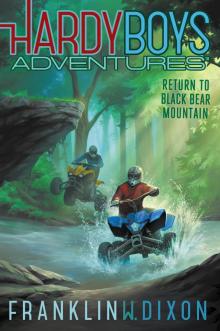 Return to Black Bear Mountain
Return to Black Bear Mountain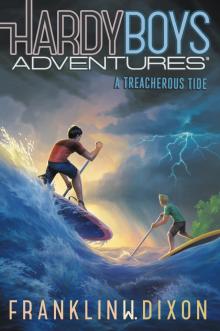 A Treacherous Tide
A Treacherous Tide Bug-Napped
Bug-Napped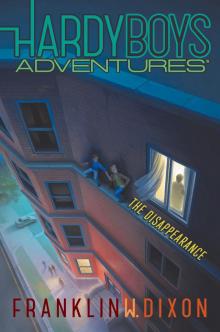 The Disappearance
The Disappearance Sea Life Secrets
Sea Life Secrets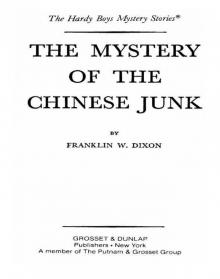 The Mystery of the Chinese Junk
The Mystery of the Chinese Junk A Skateboard Cat-astrophe
A Skateboard Cat-astrophe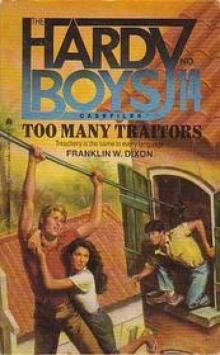 Too Many Traitors
Too Many Traitors Galaxy X
Galaxy X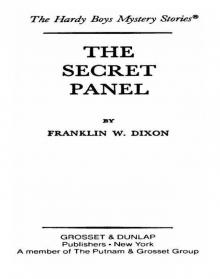 The Secret Panel
The Secret Panel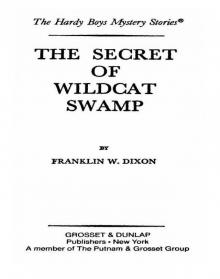 The Secret of Wildcat Swamp
The Secret of Wildcat Swamp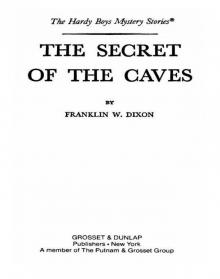 The Secret of the Caves
The Secret of the Caves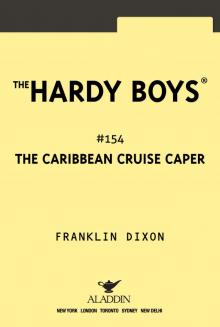 The Caribbean Cruise Caper
The Caribbean Cruise Caper Without a Trace
Without a Trace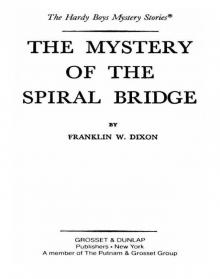 The Mystery of the Spiral Bridge
The Mystery of the Spiral Bridge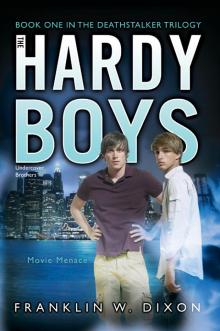 Movie Menace
Movie Menace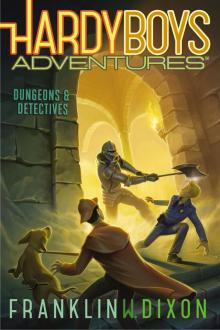 Dungeons & Detectives
Dungeons & Detectives Water-Ski Wipeout
Water-Ski Wipeout The Case of the Psychic's Vision
The Case of the Psychic's Vision X-plosion
X-plosion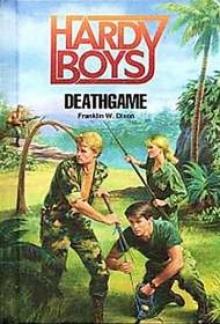 Deathgame
Deathgame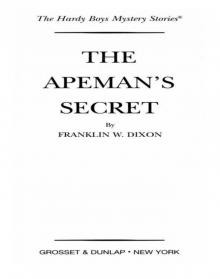 The Apeman's Secret
The Apeman's Secret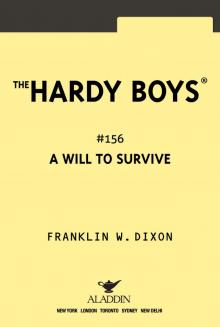 A Will to Survive
A Will to Survive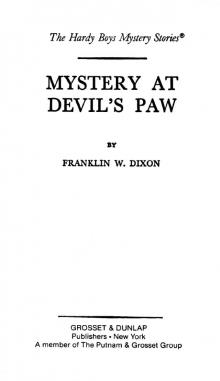 Mystery at Devil's Paw
Mystery at Devil's Paw Blood Money
Blood Money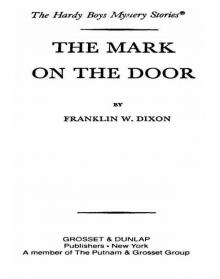 The Mark on the Door
The Mark on the Door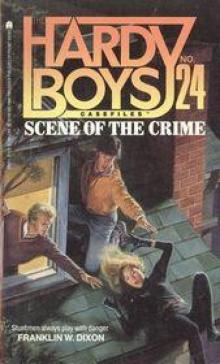 Scene of the Crime
Scene of the Crime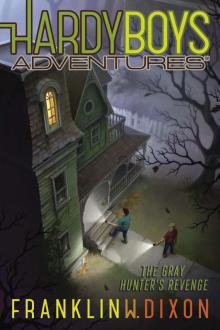 The Gray Hunter's Revenge
The Gray Hunter's Revenge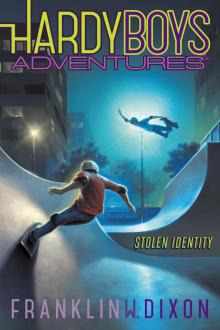 Stolen Identity
Stolen Identity The Mummy's Curse
The Mummy's Curse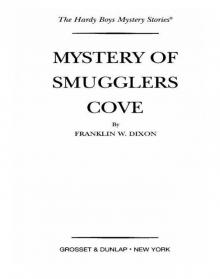 Mystery of Smugglers Cove
Mystery of Smugglers Cove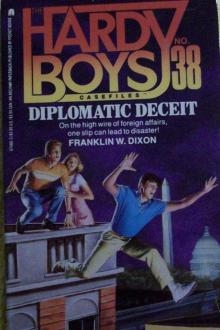 Diplomatic Deceit
Diplomatic Deceit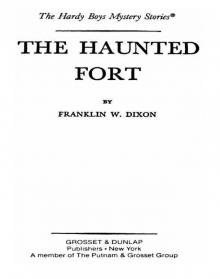 The Haunted Fort
The Haunted Fort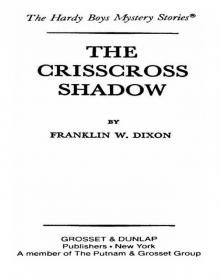 The Crisscross Shadow
The Crisscross Shadow Secret of the Red Arrow
Secret of the Red Arrow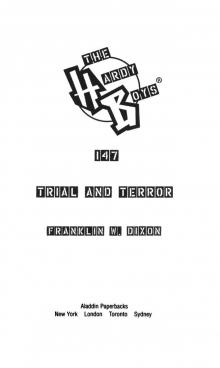 Trial and Terror
Trial and Terror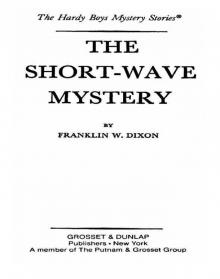 The Short-Wave Mystery
The Short-Wave Mystery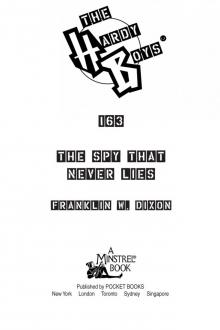 The Spy That Never Lies
The Spy That Never Lies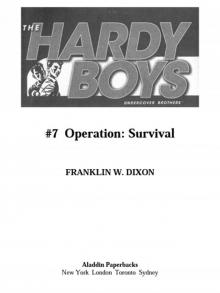 Operation: Survival
Operation: Survival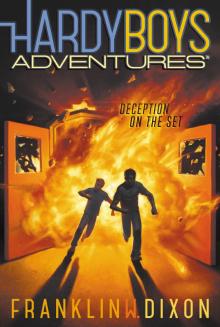 Deception on the Set
Deception on the Set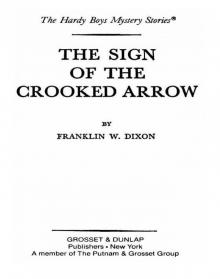 The Sign of the Crooked Arrow
The Sign of the Crooked Arrow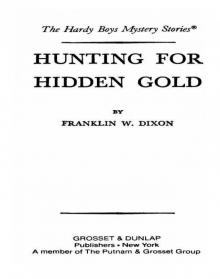 Hunting for Hidden Gold
Hunting for Hidden Gold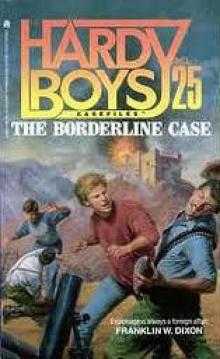 Disaster for Hire
Disaster for Hire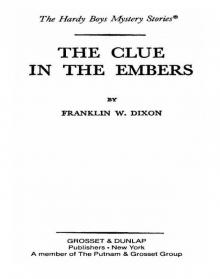 The Clue in the Embers
The Clue in the Embers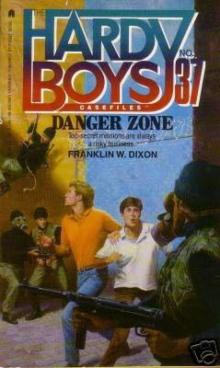 Danger Zone
Danger Zone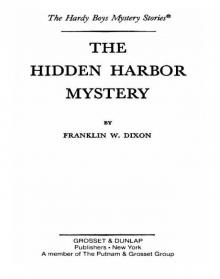 The Hidden Harbor Mystery
The Hidden Harbor Mystery Eye on Crime
Eye on Crime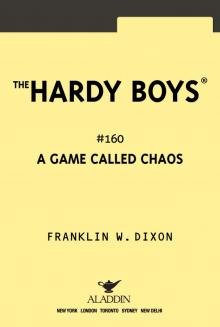 A Game Called Chaos
A Game Called Chaos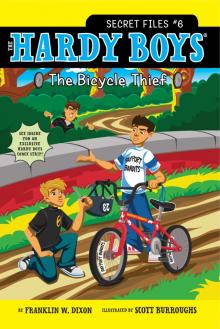 The Bicycle Thief
The Bicycle Thief The Missing Playbook
The Missing Playbook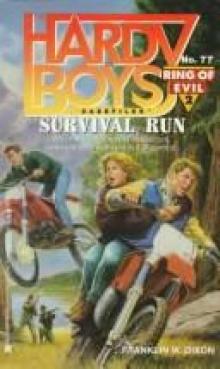 Survival Run
Survival Run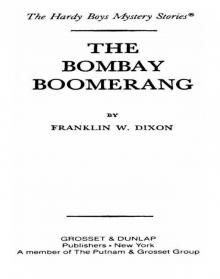 The Bombay Boomerang
The Bombay Boomerang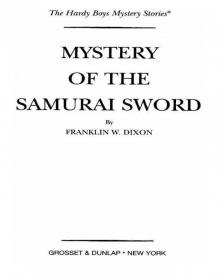 Mystery of the Samurai Sword
Mystery of the Samurai Sword Burned
Burned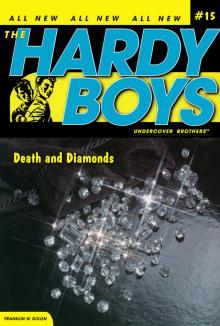 Death and Diamonds
Death and Diamonds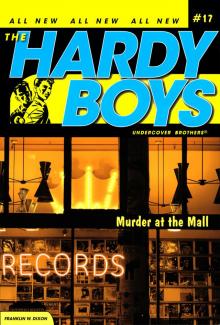 Murder at the Mall
Murder at the Mall The Prime-Time Crime
The Prime-Time Crime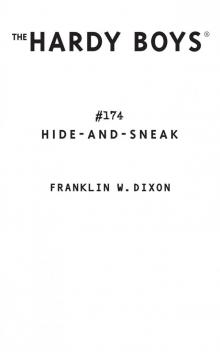 Hide-and-Sneak
Hide-and-Sneak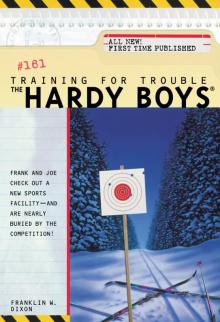 Training for Trouble
Training for Trouble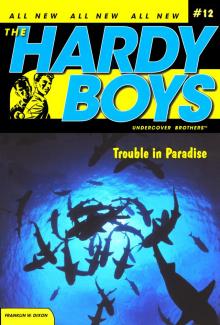 Trouble in Paradise
Trouble in Paradise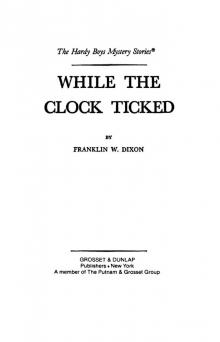 While the Clock Ticked
While the Clock Ticked The Alaskan Adventure
The Alaskan Adventure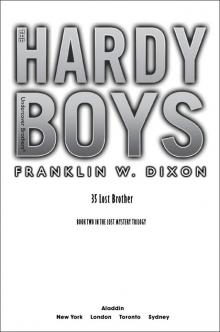 The Lost Brother
The Lost Brother Tunnel of Secrets
Tunnel of Secrets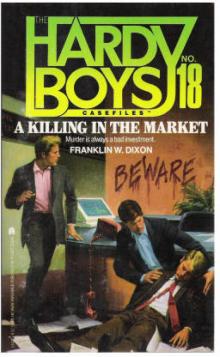 A Killing in the Market
A Killing in the Market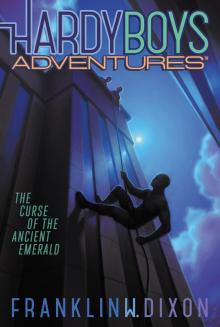 The Curse of the Ancient Emerald
The Curse of the Ancient Emerald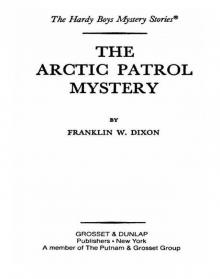 The Arctic Patrol Mystery
The Arctic Patrol Mystery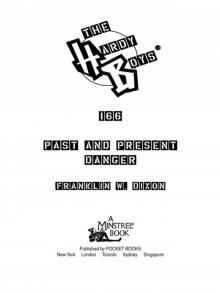 Past and Present Danger
Past and Present Danger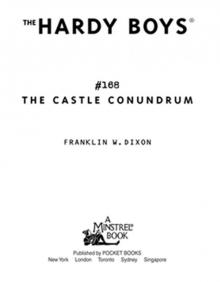 The Castle Conundrum (Hardy Boys)
The Castle Conundrum (Hardy Boys)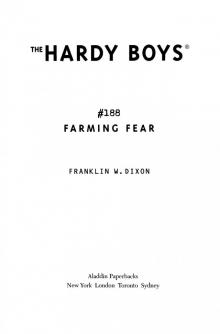 Farming Fear
Farming Fear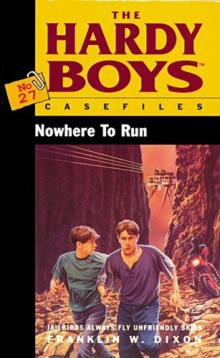 Nowhere to Run
Nowhere to Run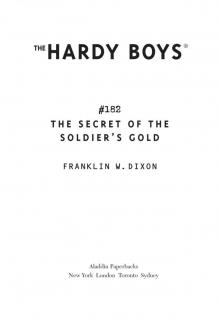 The Secret of the Soldier's Gold
The Secret of the Soldier's Gold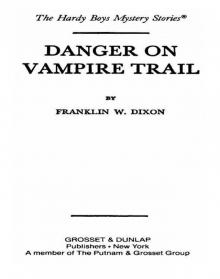 Danger on Vampire Trail
Danger on Vampire Trail The Lure of the Italian Treasure
The Lure of the Italian Treasure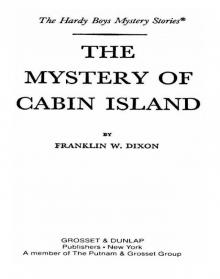 The Mystery of Cabin Island
The Mystery of Cabin Island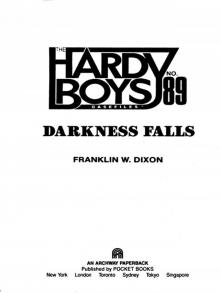 Darkness Falls
Darkness Falls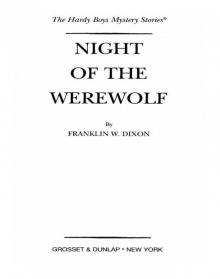 Night of the Werewolf
Night of the Werewolf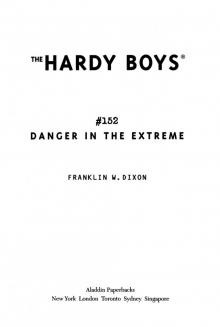 Danger in the Extreme
Danger in the Extreme The Lazarus Plot
The Lazarus Plot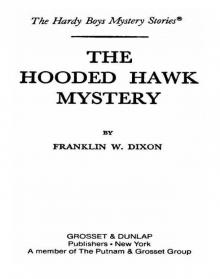 The Hooded Hawk Mystery
The Hooded Hawk Mystery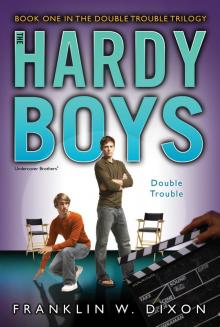 Double Trouble
Double Trouble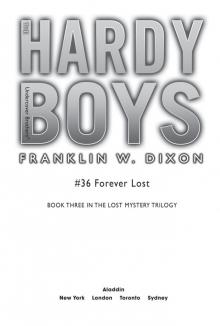 Forever Lost
Forever Lost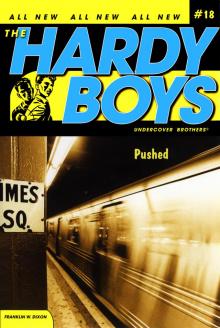 Pushed
Pushed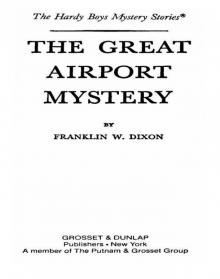 The Great Airport Mystery
The Great Airport Mystery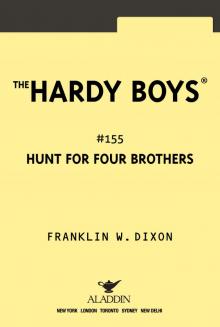 The Hunt for Four Brothers
The Hunt for Four Brothers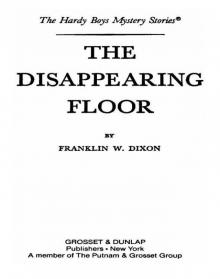 The Disappearing Floor
The Disappearing Floor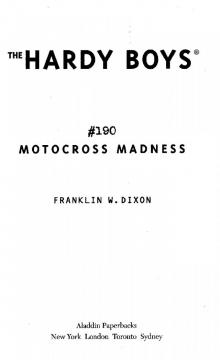 Motocross Madness
Motocross Madness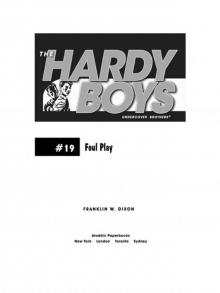 Foul Play
Foul Play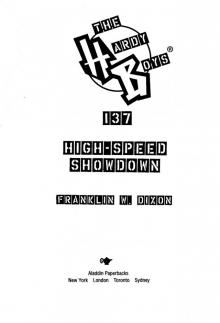 High-Speed Showdown
High-Speed Showdown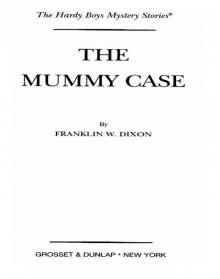 The Mummy Case
The Mummy Case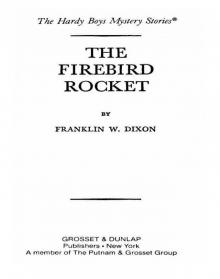 The Firebird Rocket
The Firebird Rocket Trouble in Warp Space
Trouble in Warp Space Ship of Secrets
Ship of Secrets Line of Fire
Line of Fire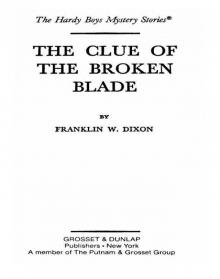 The Clue of the Broken Blade
The Clue of the Broken Blade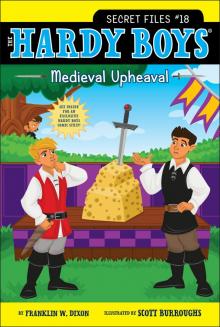 Medieval Upheaval
Medieval Upheaval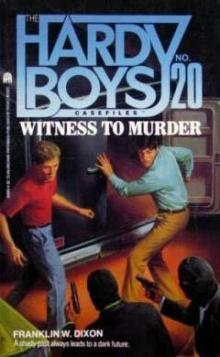 Witness to Murder
Witness to Murder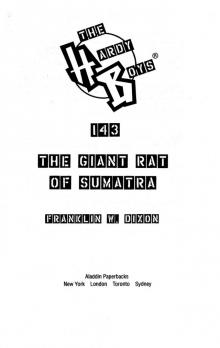 The Giant Rat of Sumatra
The Giant Rat of Sumatra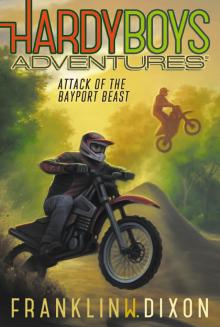 Attack of the Bayport Beast
Attack of the Bayport Beast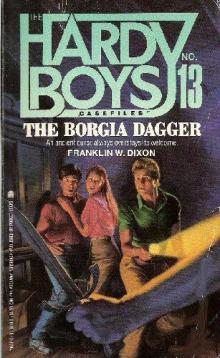 The Borgia Dagger
The Borgia Dagger Scavenger Hunt Heist
Scavenger Hunt Heist No Way Out
No Way Out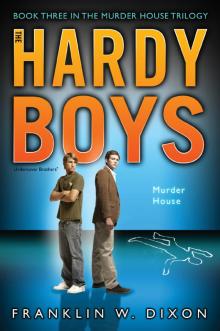 Murder House
Murder House The X-Factor
The X-Factor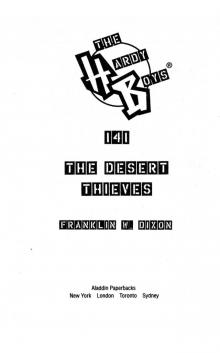 The Desert Thieves
The Desert Thieves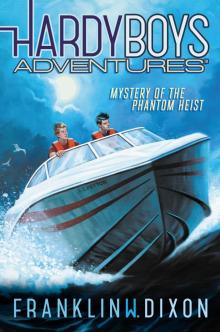 Mystery of the Phantom Heist
Mystery of the Phantom Heist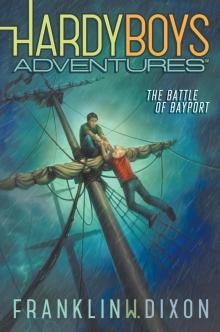 The Battle of Bayport
The Battle of Bayport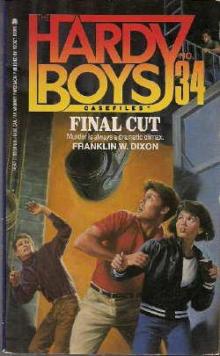 Final Cut
Final Cut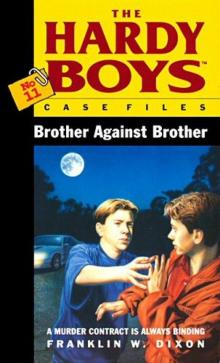 Brother Against Brother
Brother Against Brother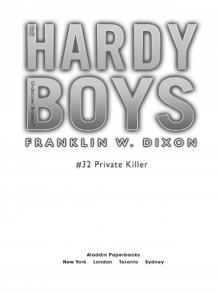 Private Killer
Private Killer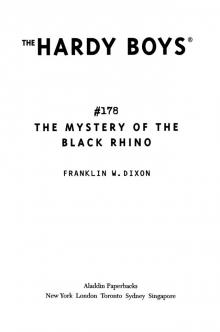 The Mystery of the Black Rhino
The Mystery of the Black Rhino Feeding Frenzy
Feeding Frenzy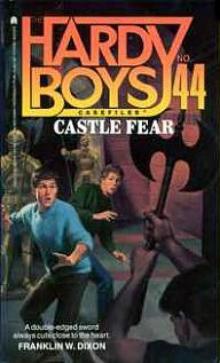 Castle Fear
Castle Fear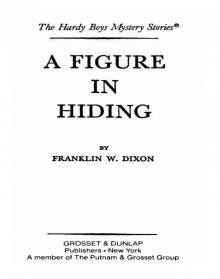 A Figure in Hiding
A Figure in Hiding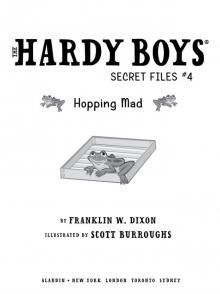 Hopping Mad
Hopping Mad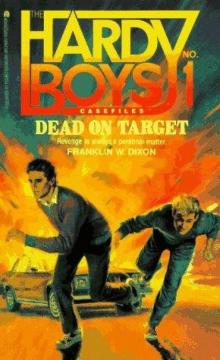 Dead on Target
Dead on Target Skin and Bones
Skin and Bones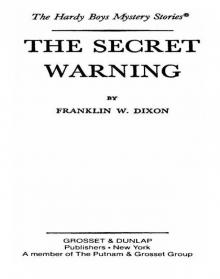 The Secret Warning
The Secret Warning Flesh and Blood
Flesh and Blood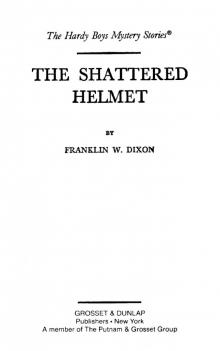 The Shattered Helmet
The Shattered Helmet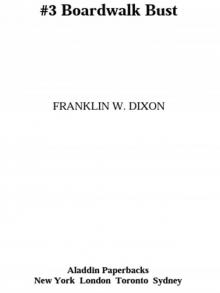 Boardwalk Bust
Boardwalk Bust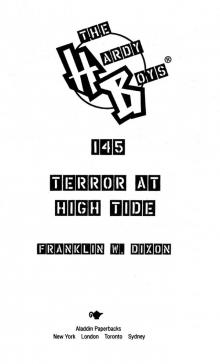 Terror at High Tide
Terror at High Tide In Plane Sight
In Plane Sight The London Deception
The London Deception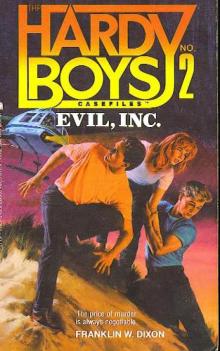 Evil, Inc.
Evil, Inc.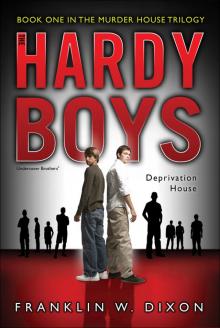 Deprivation House
Deprivation House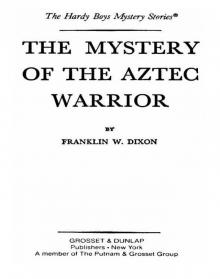 The Mystery of the Aztec Warrior
The Mystery of the Aztec Warrior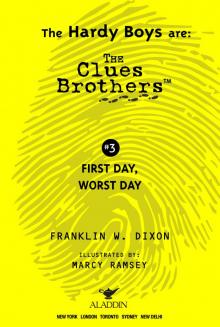 First Day, Worst Day
First Day, Worst Day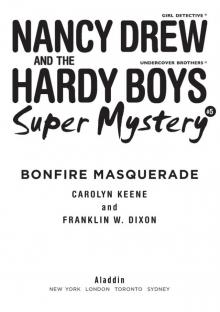 Bonfire Masquerade
Bonfire Masquerade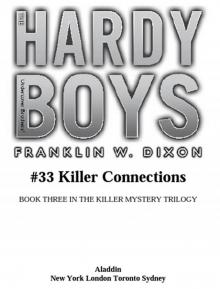 Killer Connections
Killer Connections Strategic Moves
Strategic Moves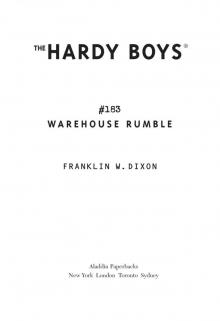 Warehouse Rumble
Warehouse Rumble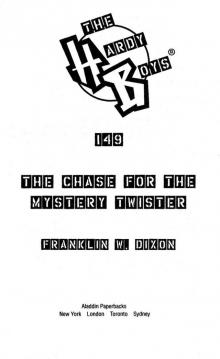 The Chase for the Mystery Twister
The Chase for the Mystery Twister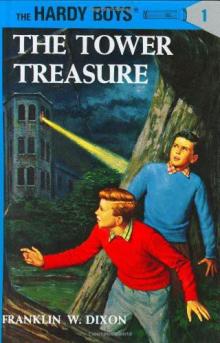 The Tower Treasure thb-1
The Tower Treasure thb-1 The Children of the Lost
The Children of the Lost The Last Laugh
The Last Laugh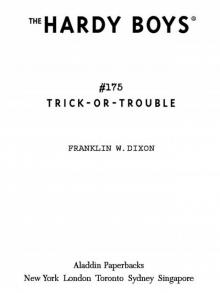 Trick-or-Trouble
Trick-or-Trouble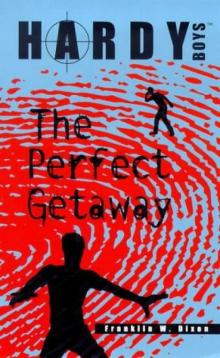 Perfect Getaway
Perfect Getaway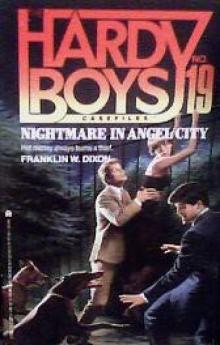 Nightmare in Angel City
Nightmare in Angel City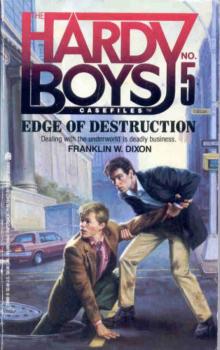 Edge of Destruction
Edge of Destruction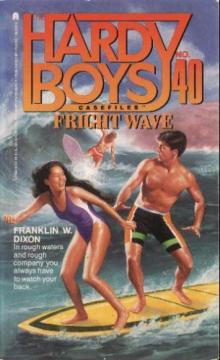 Fright Wave
Fright Wave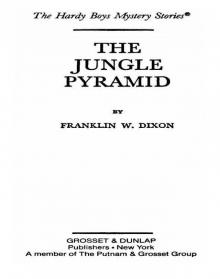 The Jungle Pyramid
The Jungle Pyramid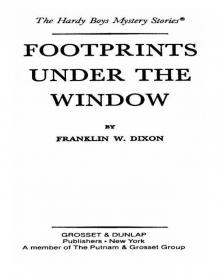 Footprints Under the Window
Footprints Under the Window The Gross Ghost Mystery
The Gross Ghost Mystery A Monster of a Mystery
A Monster of a Mystery House Arrest
House Arrest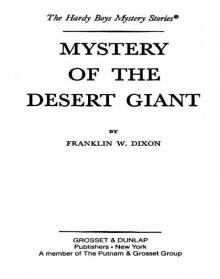 Mystery of the Desert Giant
Mystery of the Desert Giant Talent Show Tricks
Talent Show Tricks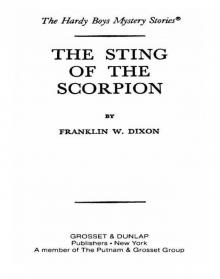 The Sting of the Scorpion
The Sting of the Scorpion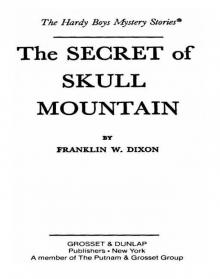 The Secret of Skull Mountain
The Secret of Skull Mountain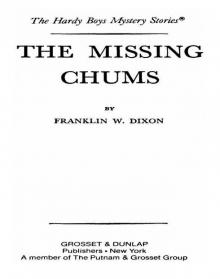 The Missing Chums
The Missing Chums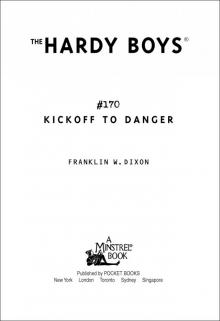 Kickoff to Danger
Kickoff to Danger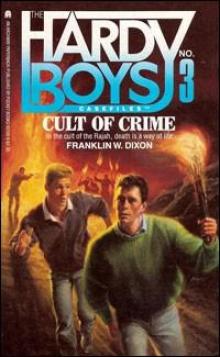 Cult of Crime
Cult of Crime Running on Fumes
Running on Fumes Martial Law
Martial Law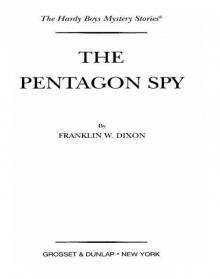 The Pentagon Spy
The Pentagon Spy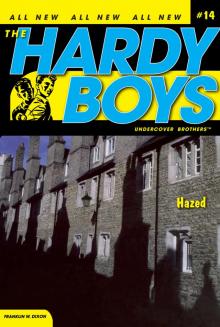 Hazed
Hazed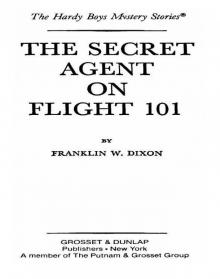 The Secret Agent on Flight 101
The Secret Agent on Flight 101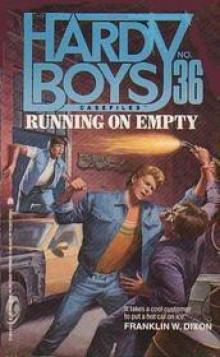 Running on Empty
Running on Empty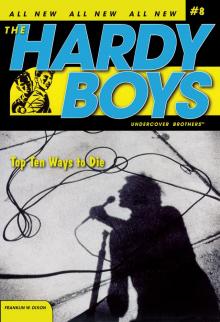 Top Ten Ways to Die
Top Ten Ways to Die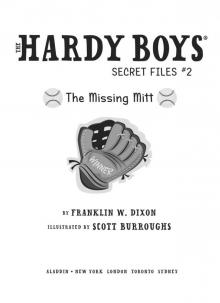 The Missing Mitt
The Missing Mitt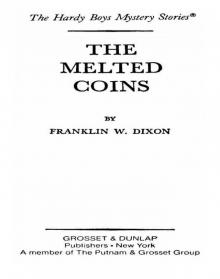 The Melted Coins
The Melted Coins The Rocky Road to Revenge
The Rocky Road to Revenge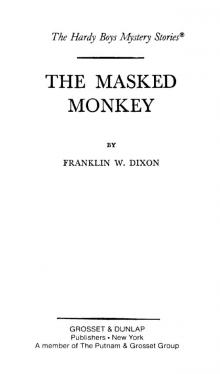 The Masked Monkey
The Masked Monkey Lost in Gator Swamp
Lost in Gator Swamp Extreme Danger
Extreme Danger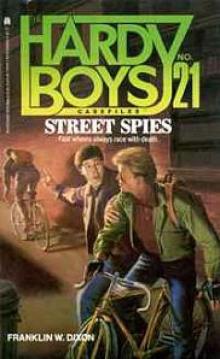 Street Spies
Street Spies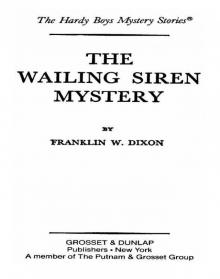 The Wailing Siren Mystery
The Wailing Siren Mystery The Dangerous Transmission
The Dangerous Transmission Hurricane Joe
Hurricane Joe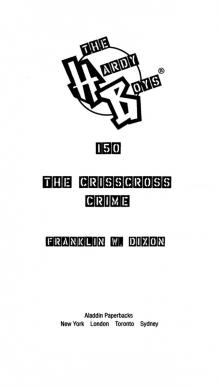 The Crisscross Crime
The Crisscross Crime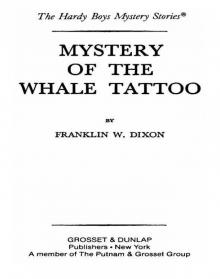 Mystery of the Whale Tattoo
Mystery of the Whale Tattoo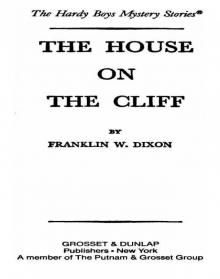 The House on the Cliff
The House on the Cliff Camping Chaos
Camping Chaos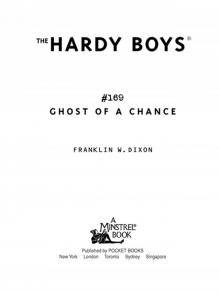 Ghost of a Chance
Ghost of a Chance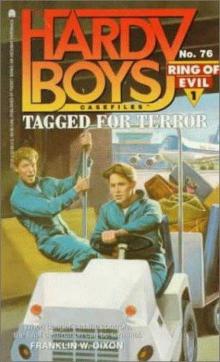 Tagged for Terror
Tagged for Terror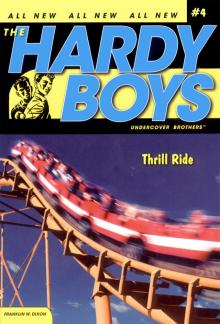 Thrill Ride
Thrill Ride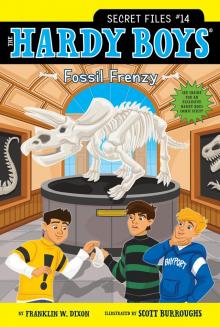 Fossil Frenzy
Fossil Frenzy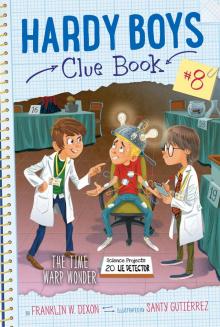 The Time Warp Wonder
The Time Warp Wonder Ghost Stories
Ghost Stories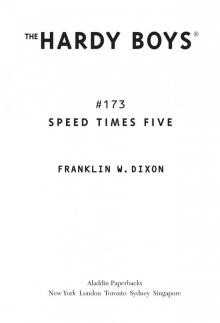 Speed Times Five
Speed Times Five What Happened at Midnight
What Happened at Midnight Three-Ring Terror
Three-Ring Terror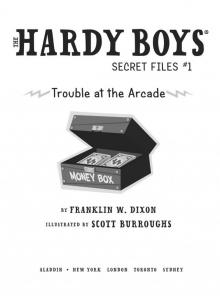 Trouble at the Arcade
Trouble at the Arcade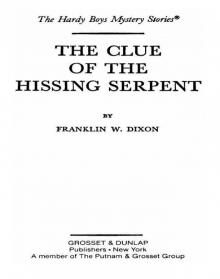 The Clue of the Hissing Serpent
The Clue of the Hissing Serpent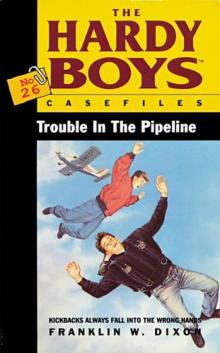 Trouble in the Pipeline
Trouble in the Pipeline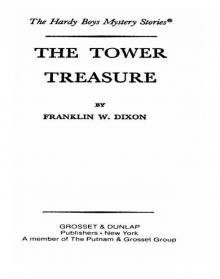 The Tower Treasure
The Tower Treasure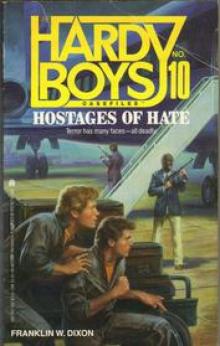 Hostages of Hate
Hostages of Hate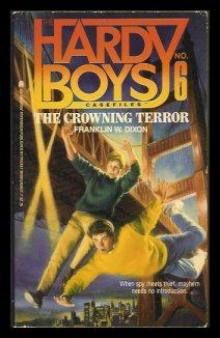 The Crowning Terror
The Crowning Terror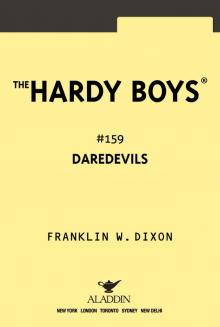 Daredevils
Daredevils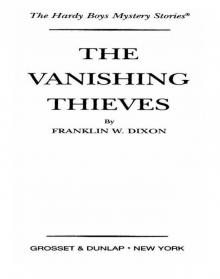 The Vanishing Thieves
The Vanishing Thieves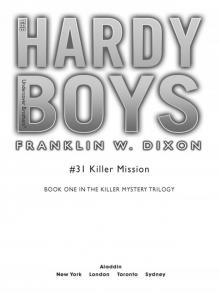 Killer Mission
Killer Mission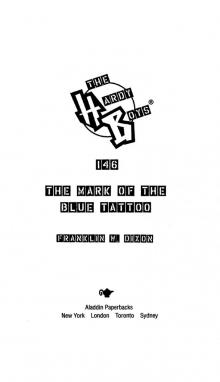 The Mark of the Blue Tattoo
The Mark of the Blue Tattoo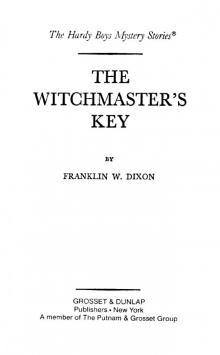 The Witchmaster's Key
The Witchmaster's Key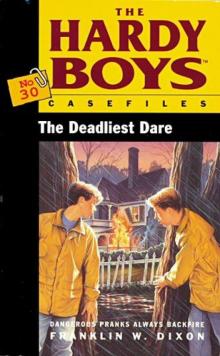 The Deadliest Dare
The Deadliest Dare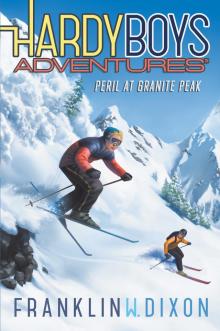 Peril at Granite Peak
Peril at Granite Peak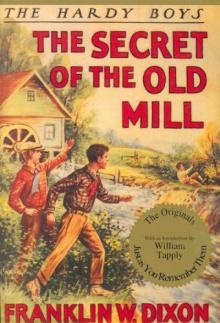 The Secret Of The Old Mill thb-3
The Secret Of The Old Mill thb-3 Rocky Road
Rocky Road The Demolition Mission
The Demolition Mission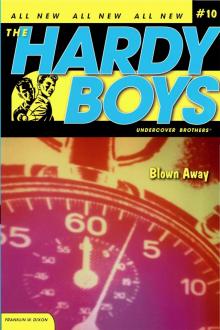 Blown Away
Blown Away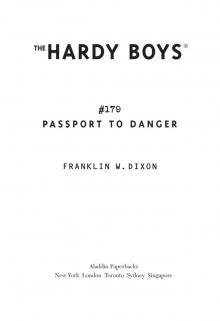 Passport to Danger
Passport to Danger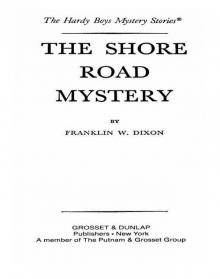 The Shore Road Mystery
The Shore Road Mystery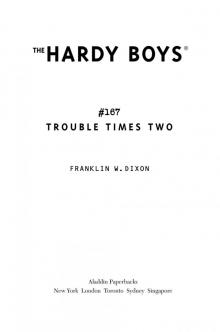 Trouble Times Two
Trouble Times Two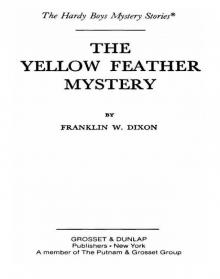 The Yellow Feather Mystery
The Yellow Feather Mystery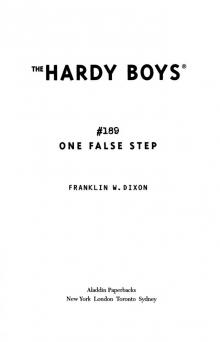 One False Step
One False Step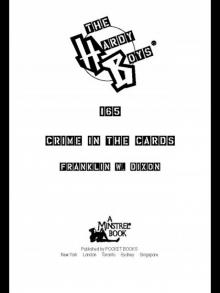 Crime in the Cards
Crime in the Cards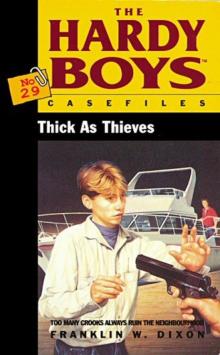 Thick as Thieves
Thick as Thieves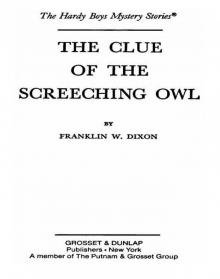 The Clue of the Screeching Owl
The Clue of the Screeching Owl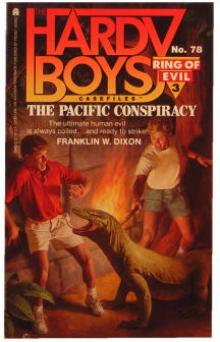 The Pacific Conspiracy
The Pacific Conspiracy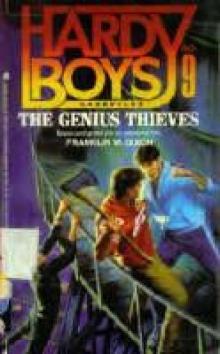 The Genius Thieves
The Genius Thieves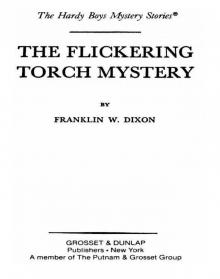 The Flickering Torch Mystery
The Flickering Torch Mystery Into Thin Air
Into Thin Air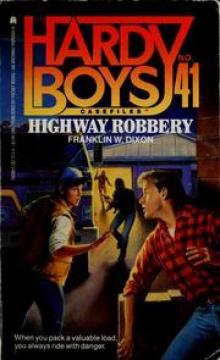 Highway Robbery
Highway Robbery Deadfall
Deadfall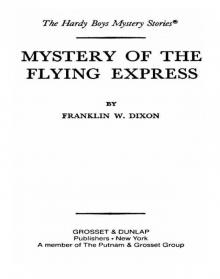 Mystery of the Flying Express
Mystery of the Flying Express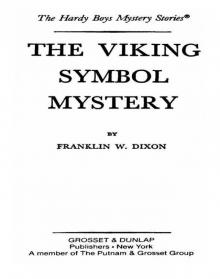 The Viking Symbol Mystery
The Viking Symbol Mystery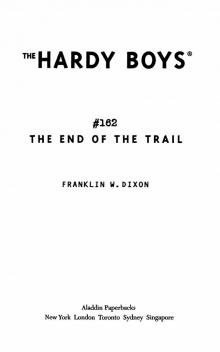 The End of the Trail
The End of the Trail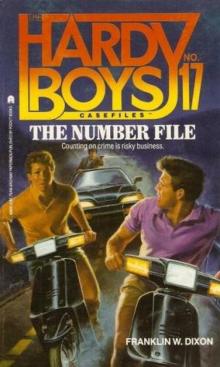 The Number File
The Number File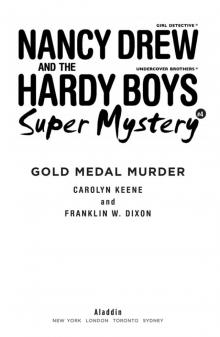 Gold Medal Murder
Gold Medal Murder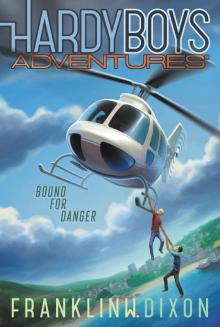 Bound for Danger
Bound for Danger Collision Course
Collision Course The Madman of Black Bear Mountain
The Madman of Black Bear Mountain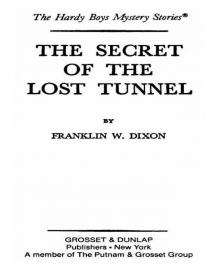 The Secret of the Lost Tunnel
The Secret of the Lost Tunnel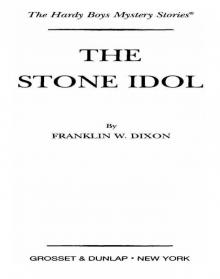 The Stone Idol
The Stone Idol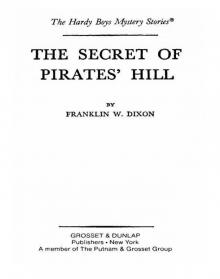 The Secret of Pirates' Hill
The Secret of Pirates' Hill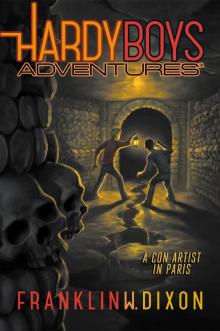 A Con Artist in Paris
A Con Artist in Paris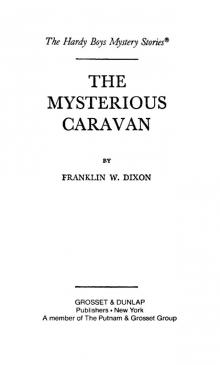 The Mysterious Caravan
The Mysterious Caravan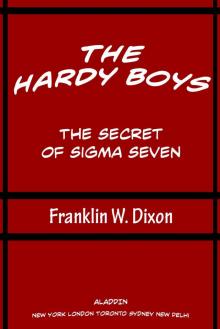 The Secret of Sigma Seven
The Secret of Sigma Seven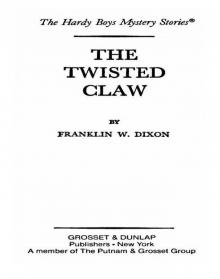 The Twisted Claw
The Twisted Claw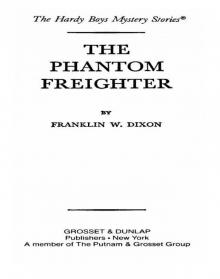 The Phantom Freighter
The Phantom Freighter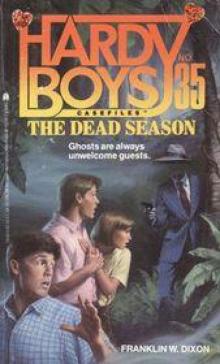 The Dead Season
The Dead Season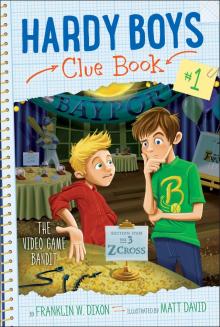 The Video Game Bandit
The Video Game Bandit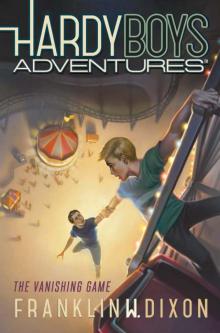 The Vanishing Game
The Vanishing Game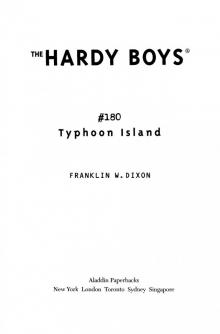 Typhoon Island
Typhoon Island